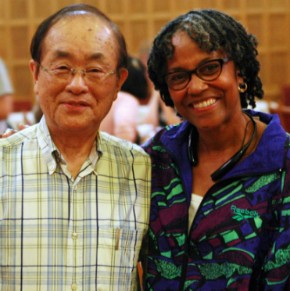Syngman Rhee, Presbyterian and ecumenical leader, dies at 83

Syngman Rhee, 83, a former North Korean refugee and leader for more than five decades in the Presbyterian Church (U.S.A.) and in ecumenical circles, died January 14 in Atlanta shortly after being diagnosed with an aggressive cancer.
Rhee was born in 1931 in Pyongyang, now part of North Korea, to a Presbyterian family.
“My father was a pastor who was martyred in prison in the fall of 1950,” Rhee said in an interview with Faith and Leadership at Duke Divinity School in 2013. “After that, my mother insisted that her two sons—me, at 19, and my 17-year-old brother—go to South Korea as refugees, because she feared the same thing would happen to us.”
They walked for ten days and joined the South Korean marines. Rhee used a Korean expression for “second-chance life” to describe what he received.
“In a real sense, as a Korean marine during the war, there was no particular reason that I survived, whereas my comrades perished,” he said. His goal became “wanting to be faithful to the given opportunities each day and each year.”
He immigrated to the United States in 1956 and earned degrees at Louisville Presbyterian Seminary, Yale Divinity School, and Chicago Theological Seminary.
“I became a Presbyterian Church (U.S.A.) minister to follow in my father’s footsteps and to carry on the task that he was unable to complete,” said Rhee, who was ordained in 1960.
He served as a congregational pastor and as coordinator for Middle East Missions for the United Presbyterian Church. As a campus minister in the 1960s at the University of Louisville, he was active in the civil rights movement. That experience inspired his work for reconciliation between North and South Koreans, he told members of Columbia Theological Seminary, where he was visiting professor in the practice of global leadership development at the time of his death. Rhee led the rebuilding of churches in North Korea and coordinated Presbyterian mission work in East Asia.
He served as president of the National Council of Churches from 1992 to 1993 and as moderator of the General Assembly of the Presbyterian Church (U.S.A.) from 2000 to 2001.
“I watched him holding together a great diversity of people,” said John Buchanan, Christian Century editor and publisher, recalling Rhee’s work with the NCC. “Syngman had a moral authority about him. I think it came out of his journey and experience with violence and tragedy.”
Buchanan, who served as moderator of the PCUSA a few years before Rhee, also remembered Rhee’s handling of Presbyterian debates. “Syngman was magnificent at getting people to dial back their anger and talk to one another,” he said.
Rhee taught mission and evangelism and Asian theology and served as director of the Asian-American Ministry and Mission Center at Union Presbyterian Seminary in Richmond, Virginia, from 1998 to 2011.
Having come to the United States in the mid-1950s, he “experienced all the history of the church’s decline,” he said in the interview with Faith and Leadership. “Unfortunately, I think mainline denominations were so involved in bearing the fruits of our faith that they neglected nurturing the roots of our faith—basic things like the importance of scripture, devotion, and worship.”





